Look for Bolchazy-Carducci Publishers' Exhibit at Conferences in 2011 |
SCOLT-LFLTA – Southern Conference on Language Teaching-Louisiana Foreign Language Teachers Association
March 10–12, 2011
Baton Rouge, LA
Representative: Donald Sprague
- Donald Sprague will present a talk entitled: "Fusion: The Best of All Possible Words—A Comprehensive Approach to Teaching Latin"
CANE - Classical Association of New England
March 18–19, 2011
Mount Holyoke College
South Hadley, MA
Representative: Donald Sprague
Dickinson Latin Workshop Spring 2011
Saturday, March 26, 2011
Dickinson College
Carlisle, PA
Julius Caesar in his Time: The General as Historian
Hans-Friedrich Mueller, Union College
Author of BCP AP* Caesar Text and coauthor of Caesar: A Transitional LEGAMUS Reader
Dickinson College, Tome 115, 10:00 am to 5:00 pm.
This workshop considers Caesar both as a historical figure and as an author. It will include strategies for teaching Caesar in a sophisticated and interesting way, and updates on how scholars and historians have reevaluated his career and works in recent years. Special attention will be given to themes shared with the Aeneid.
For more information click here.
CAMWS – Classical Association of the Middle West and South
April 6–9, 2011
Grand Rapids, MI
Amway Grand Plaza at the invitation of Grand Valley State and Calvin College
Representatives: Drs. Lou and Marie Bolchazy, and Allan Bolchazy
Panel: "New Resources and Methods for Teaching Greek" includes two papers presented by the Bolchazy-Carducci Publishers Greek Transitional Reader authors.
Thursday, April 7: 8:00–10:00 PM Section D Fifth Paper Session Haldane Room Wilfred E. Major (Louisiana State University), organizer
"εν αργη: Reversion to Language Youthfulness in Determining Grammar Notes and Review for an Intermediate Reading Text" John H. O’Neil (St. Charles Preparatory Academy) and Timothy F. Winters (Austin Peay State University) "Reading Passages for Transitioning to Plato" Abigail Roberts (McCallie School) and Wilfred E. Major (Louisiana State University)
(click here to download the abstract)
Panel: "Latin in Small Packages: Expanding and Varying Advanced Latin Curricular Options" organized by Bolchazy-Carducci Publishers Readers Series Editor Ronnie Ancona. Series authors will explore the BC Latin Readers' "small package" approach to Latin curricula, which has as one of its aims to expand and vary what can be taught at the advanced level.
Saturday, April 9: 3:30–5:30 PM Section F Twelfth Paper Session Heritage Hill Room
Ronnie Ancona (Hunter College and The Graduate Center, CUNY), organizer
"Latin in Small Packages: A Series Editor’s Perspective" Ronnie Ancona (Hunter College and The Graduate Center, CUNY)
"Latin Epic" Alison M. Keith (University of Toronto)
"Suetonius Segmented" Josiah Osgood (Georgetown University)
"Seneca for Students: Six Suggestions. James Ker (University of Pennsylvania)
"A Cicero Reader" James M. May (St. Olaf College)
(click here to download the abstract)
SWCOLT – Southwestern Conference on Language Teaching
April 7–9, 2011
Fort Worth, Texas
Representatives: Donald Sprague and Rose Williams
- Rose Williams will give a talk entitled “Latin and Roman Ideals in the Hispanic New World.”
The 46th International Congress on Medieval Studies
May 12–15, 2011
Western Michigan University
Kalamazoo, MI
Representatives: Betty Brendel and Adam Velez
ACL - American Classical League
64th Annual Institute
June 25–27, 2011
University of Minnesota
Radisson University Hotel
Minneapolis, MN
Representatives: Drs. Lou and Marie Bolchazy, and Allan Bolchazy
National Junior Classical League Annual Convention
July 25–30, 2011
Eastern Kentucky University
Richmond KY
Representative: Allan Bolchazy
Other 2011 meetings will be announced in a future issue. |
|
Upcoming FREE
Latin for the New Millennium Webinars |
March 8
Latin for the New Millennium editor Don Sprague and Bolchazy-Carducci Production and eLearning Product Manager Jody Cull team up to give an introduction to and overview of the Latin for the New Millennium Teachers’ Lounge.
This webinar will familiarize teachers new to Latin for the New Millennium with the Teachers’ Lounge and for those more familiar with this teaching resource will provide tips on how to maximize the resources of the Teachers’ Lounge.
Maximizing the Resources of the LNM Teachers’ Lounge will be held Tuesday, March 8, 6–7 pm EST and will last approximately one hour.
April 5 and April 19
Kelly Northrup of the Webb School, Tennessee has been using Latin for the New Millennium for three years. An LNM enthusiast and frequent contributor to the LNM Teachers' Lounge, Kelly is a dynamic teacher and an inspiring webinar presenter. She is scheduled to give the following two webinars.
Implementing Latin for the New Millennium Levels 1 and 2 will be held Tuesday, April 5, 6–8 pm EST and will last approximately two hours.
Kelly will provide practical advice, suggestions, and tips for using the various components of levels 1 & 2 of LNM. She will be happy to field questions from webinar participants.
Activities, Games, and Projects for Latin for the New Millennium Levels 1 and 2 will be held Tuesday, April 19, 6–7:30 pm EST and will last approximately ninety minutes.
- All you need to participate in these webinars is high-speed Internet access, computer speakers/ headphones, and your access code, which we will provide to you once you register.
- Participation is free. All webinars provide an opportunity for participants to ask questions.
- Learn lots—attend each presentation. We’re happy to provide documentation of your participation for your supervisor(s).
For more information about and to register for LNM free webinars click here
|
|
Latin for the New Millennium, Level 3 |
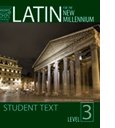 In my role as editor of LNM 3, I serve both as a resource for LeaAnn Osburn and Helena Dettmer and as the supervisor for the project, monitoring its timeliness and the consistency of its parts as well as coordinating various collaborators and their contributions. For instance, Dr. John Traupman of St. Joseph's University is a contributing editor with responsibility for checking the macrons of the Latin. For the Teacher's Manual, we have asked Dr. Karrie Singh of Florida State University to develop English derivative analyses as well as student exercises. I also develop feedback materials for the consultants and for the pilot teachers and their students. In this issue, I will share with you the very significant role the consultants play in the development of a student text. In a later issue, I will talk about the process of choosing illustrations for LNM 3. In my role as editor of LNM 3, I serve both as a resource for LeaAnn Osburn and Helena Dettmer and as the supervisor for the project, monitoring its timeliness and the consistency of its parts as well as coordinating various collaborators and their contributions. For instance, Dr. John Traupman of St. Joseph's University is a contributing editor with responsibility for checking the macrons of the Latin. For the Teacher's Manual, we have asked Dr. Karrie Singh of Florida State University to develop English derivative analyses as well as student exercises. I also develop feedback materials for the consultants and for the pilot teachers and their students. In this issue, I will share with you the very significant role the consultants play in the development of a student text. In a later issue, I will talk about the process of choosing illustrations for LNM 3.
We have secured a group of nine consultants who represent a wealth of experience teaching Latin at the middle school, high school, and college levels. They represent private and public, urban and suburban schools from across the country. Many of them served as consultants for LNM Levels 1 & 2 and several are presently teaching from Latin for the New Millennium in their classrooms. Three classrooms of mixed ability Latin 3 and 4 students piloted the LNM 3 Catullus Unit, and as I write two of those classes are additionally piloting the Cicero Unit.
Each consultant reads and reviews each page of the student text and the teacher's manual providing both positive feedback and constructive criticism, suggestions for improvement, concerns about clarity, and recommendations for pertinent additions. As editor, I then collate the consultants' feedback into a single document for LeaAnn Osburn and Helena Dettmer to review. This respects the consultants' confidentiality and encourages them to be as frank as possible in assessing the manuscript. Occasionally, a consultant may ask me to rephrase or tone down their concerns as I see fit. LeaAnn and Helena evaluate the set of responses taking the recommendations and suggestions to heart. The three of us discuss how to incorporate the feedback, relegating some suggestions to the student text and others to the teacher's manual. The feedback from the students and high school teachers helps us check the pedagogical soundness of the text as well as its student-friendliness. The college professors offer such thoughts as well as a special insight into the scholarly content of material in which they may have more expertise.
This process greatly enhances the quality of the final product. And, we so appreciate these hardworking colleagues for carving time from their very busy schedules to provide their valuable insights. At the moment, the consultants are busy reviewing the LNM 3 Cicero Unit. We'll introduce you to this wonderful group of collaborators in a later issue of eLitterae.
|
|
Summer Professional Development Opportunity |
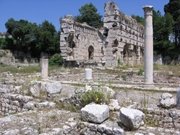
Roman bath remains at ancient Cemenelum, in today's Nice.
Still looking for a summer professional development opportunity? Check out Bolchazy-Carducci's Latin Teachers Tour. Join us as we visit Roman and post-antique sites in northern Italy and Provence. Experience firsthand such evocative places as Galileo's podium in Padua, the Teatro Olympico in Vicenza, the Papal Palace in Avignon, and Cezanne's atelier in Aix-en-Provence. You'll encounter pre-Roman Entremont in Aix, the Roman amphitheatre in Verona, Roman villa remains on Sirmio, the famous Etruscan liver in Piacenza, and so much more! At the same time, you'll savor marvelous meals and delicious wines. For more information and a registration form, click the link above; for questions, contact Don Sprague, veteran tour leader, at don@bolchazy.com.
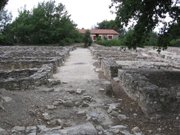
Entremont, a Gallic site near Aix-en-Provence
Check out the day-by-day itinerary. |
|
National Exam Application/Registration Deadlines |
|
Free Bolchazy-Carducci Roman Calendar |
Bolchazy-Carducci’s annual school year calendar is in print and has been mailed. Sorry, we are out of the printed copies but it is available to download from our website.
2010-2011 Roman Calendar
|
|
Preview Bolchazy-Carducci Titles |
Preview Bolchazy-Carducci titles before you buy using Google Preview. How does Google Preview work?
Video
|
|
Downloadable Products

|
iPodius - Bolchazy-Carducci Publishers online shop for: audio, software, video, and teacher created materials.
|
|

Become a FAN of Bolchazy-Carducci Publishers, visit our Facebook Fan page for the latest news from BCP.
BCP Facebook Fan Page |
|
|
|
Dear Friends and Colleagues,
The first weeks of the new semester will surely be remembered for a winter that terrorized the country. It seems no state has been spared whether it's been unusual cold or snow. The most recent storm that affected an historical swath of thirty-three states dealt us a mess! We were wise to close the office the day following the blizzard as Lake County declared that day a civil emergency and asked people to stay home. When the storm knocked out our server, our in-house IT guru, Adam Velez, saved the day, as he was able to walk to the office from his nearby home and restore things to working order.
I'm writing you at my colleague LeaAnn's request that I assemble this issue. She's hard at work on Latin for the New Millennium, Level 3, and recuperating from some temporary health problems. This provides me a special opportunity to do something LeaAnn's modesty would not allow her. Many of you know LeaAnn has resettled from the Chicago area to Phoenix. What you might not know is that her son Eric, a professionally trained chef, runs a restaurant in downtown Phoenix. The Centurion serves a variety of European dishes from the regions where the ancient Roman centurion marched with his men. Featuring the cuisines of France, Italy, Belgium, Spain, etc., the Centurion has earned raved reviews. So, do check it out, if you're visiting the Phoenix area.
With the folks at College Board having finally posted the curriculum framework for the 2013 AP Latin Exam, we've noted lots of flurry on Latin list serves and other venues as teachers express concern about Caesar texts being available. Please spread the word and let your colleagues know that Bolchazy-Carducci has been on top of this curricular change and need from the outset. Let folks know that next spring they'll be able to see sample chapters of three new texts: Caesar: A LEGAMUS Transitional Reader, A Caesar Workbook, and a Caesar Primary Text. In addition, we are developing a set of vocabulary flashcards for Caesar. This issue of eLitterae features an interview with Rose Williams who is coauthoring two of the new Caesar texts. Future issues will feature her coauthors Professors Debra Nousek and Hans-Friedrich Mueller and other items concerning the new texts.
For the new Vergil curriculum, Barbara Boyd Weiden is revising her popular Vergil's AENEID Selections to match the new curriculum. Additionally, she and coauthor Katherine Bradley are reworking A Vergil Workbook.
All best wishes as you bring your students the wisdom of the ancients in your Greek and Latin classes.
Don Sprague
Editor |
|
An Interview with New Caesar Texts
Coauthor Rose Williams |
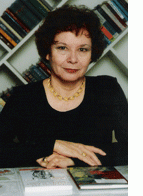 Popular author Rose Williams is working on two of Bolchazy-Carducci's new Caesar texts. With Hans-Friedrich Mueller of Union College, she is developing Caesar: A LEGAMUS Transitional Reader. She joins Debra Nousek of Western Ontario University as coauthor of A Caesar Workbook. Popular author Rose Williams is working on two of Bolchazy-Carducci's new Caesar texts. With Hans-Friedrich Mueller of Union College, she is developing Caesar: A LEGAMUS Transitional Reader. She joins Debra Nousek of Western Ontario University as coauthor of A Caesar Workbook.
DES: What inspires you to write books for high school Latin students?
RRW: I love students, and I believe that Latin is one of the most useful studies they can undertake for their understanding of today's world, its languages, and its ideas and history. I hope to make that study more intelligible, more relevant, and more interesting.
DES: What attracted you to the current Bolchazy-Carducci Caesar texts project?
RRW: I truly enjoy teaching the works of Caesar and to see them taught. He is to me a pivotal figure in the evolution of today's world. His ability to tell a good story is outstanding, his grammar and language are concise, graceful, and powerful; and his character is a fascinating study for many reasons. If he is a calculating manipulator, he is very good at it and would reward careful study for that alone. If his famous clemency is a farsighted manipulation, I wish other conquerors would practice manipulation by the forgiving and reinstating of their enemies. Caesar's writings show us a masterful use of language to promote one's perspective on a situation.
DES: How have the LEGAMUS Transitional Readers impacted your high school Latin classes?
RRW: I have taught Vergil for several decades to numerous students at various levels of expertise. In my advanced Vergil AP class I now use the Vergil LEGAMUS, which is the best introduction I can imagine for Vergil study. Hopefully the Caesar LEGAMUS will be as useful.
DES: What do you recall as the highpoints of teaching Caesar "back in the day," and what about the downside?
RRW: I do not recall a downside. I always approached Caesar as I approach all historical projects—not as a series of dates and wars, but as the experiences of people in a particular set of circumstances. Linguistically, Caesar possesses great storytelling ability, clarity of expression, irony, and humor; historically, he demonstrates a concise grasp of geography and its effect on mankind; philosophically, he understands rivalry, lust for power, fear of the powerful, and economic need. A careful consideration of these factors makes a rich study. Students I taught thirty years ago often greet me with a quote from Caesar.
DES: Some folks felt that teaching Caesar was not a good fit for high school girls. What's your opinion?
RRW: "A good fit for girls, indeed!" Twenty-first century females are busy showing us that there is no one category for "girls." They may be prizefighters, football players, or ballerinas. Actually, this has always been so. Fulvia, wife of Marc Antony, led an army to battle against Octavian in defense of her absent husband's interests. However, if we are to consider the most traditional type of girl, she loves heroes. She loves Vorenus and Pullo for the same reason she loves football players and soldiers—because they never let good sense limit their derring-do. She is interested in people and their motives, and empathetic with the underdog. She loves Caesar for sending the remaining Helvetians and Nervii home, arranging for their needs, and coming up with a reason for this clemency that will satisfy the Roman Senate. I have taught Caesar to many females of all types—some are now heads of science and math departments at major universities; some are models or actresses; some are social leaders. When they speak of their remembered Caesar study, they mention learning to express ideas clearly, learning to see why people feel compelled to act, and learning the impact, the tragedy, and the results of change and war.
DES: On an unrelated subject, if you were to give young Latin teachers one nugget of advice based on your years of success as a Latin teacher, what would that be?
RRW: Listen to your students. Listen with kindness and respect. Ask lots of questions, both to be sure they are listening and to be sure what you are saying and what they are hearing are the same. Listen to their grasp of the material, what they like and don't like about it, and their original ideas about it—which are sometimes very original indeed. Exploring ideas together can enrich both you and your students.
DES: After the Caesar texts, what's on your list of projects due to receive your attention and enthusiasm?
RRW: 1) I will give a great deal of time to creating an improved Vergil AP course for my advanced students.
2) I am continuing my work with Latin literature written in the Hispanic New World colonies.
3) I have for some years now been working, in between more urgent projects, on a history called Blood of the Caesars. It is written in the style of Tacitus and Sallust in that it takes the facts given by ancient writers and weaves them into a connected story punctuated by speeches that might have been given by the characters, who are all authentic personages of ancient Rome. I see the Caesars, as do Dr. Garrett Fagan and others, not as monsters but as faulty men thrust into incredible circumstances.
Rose Williams has written a number of books for high school Latin students. Her most recent Latin text is A Beginning Christian Latin Reader: De Bonis Cogitationibus; other recent titles include the four enrichment texts for Latin for the New Millennium: From Romulus to Romulus Augustulus, The Original Dysfunctional Family, The Clay-footed SuperHeroes, and From Rome to Reformation. Ms. Williams has taught at both the high school and the college levels. She regularly speaks at classics conferences and is currently excited about her research exploring the Latin legacy of the American Southwest. Abilene's Providence Classical Academy has lured her back to the classroom. Magistra Williams meets twice weekly with advanced students and is preparing them for next year's AP Latin work. |
|
Bolchazy Triumvirate Attends AIA/APA Conference |
All of the Bolchazys (Lou, Marie, and Allan) attended the 2011 AIA/APA conference held January 5–9 in San Antonio. We were pleased to have four new books to display this year, from two new series.
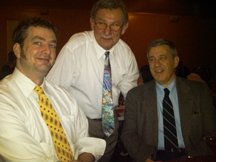
APA Networking: Del Chrol (Marshall University, LNM Audio Recordings), Lou Bolchazy, and Henry Bender (The Hill School, Catullus Expanded and Poet and Artist: Imaging the Aeneid)
Three new books we displayed were from the BC Latin Reader series: A Livy Reader, A Suetonius Reader, and A Roman Verse Satire Reader. The first two titles were so new that Allan had to hand carry them to the conference. Conferees seemed quite interested in the readers; several noted how impressed they were with the authors of the readers. Ronnie Ancona, the series editor, spent time at our booth talking to folks interested in the series. Also a number of the BC Latin Reader authors were in attendance and stopped by: Jeffrey Tatum, Catherine Keane, Susanna Braund, and Jim May.
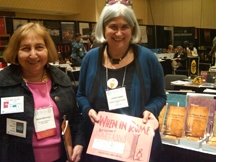
Marie Bolchazy and Judy Hallett (University of Maryland, A Roman Women Reader—a BC Latin Reader)
The final new title, from our Transitional Greek Reader series, is Homer: A Transitional Reader. We also had considerable interest in Plato: A Transitional Reader. Two (out of four) of the authors, Willie Major and Tim Winters, stopped by to tell us that they will be presenting on the transitional readers at CAMWS 2011.
We prominently displayed Latin for the New Millennium (LNM). On Saturday, APA offered round table discussions including one on LNM for both professors (Dan Curley of Skidmore, who served as moderator; Ronnie Ancona from Hunter; and author Terence Tunberg of the University of Kentucky) already using and those considering using the series. Both Dr. Ancona and Dr. Curley detailed their experiences and indicated how pleased they were with LNM. Three professors from three different universities indicated that they plan to adopt the series. One purpose of the discussion was to give the publishers feedback; as a result we are now providing hyperlinks to the electronic version of the LNM teacher’s manuals. [Editor's Note: Our Production and eProduct Manager, Jody Cull, is hard at work on this.]
A highlight of the conference was a marvelous performance of Athens v Sparta, a presentation of Thucydides’ history set to indie rock music that is available on CD from Bolchazy-Carducci. Classics Professor Jenny McBride from Trinity College gave a special guest introduction. At our booth, we sold out of the CDs. We had a good talk with Charlie Roadman, who put the production together. Lou suggested that Charlie’s next production could be the Epic of Gilgamesh.
Marie Bolchazy |
|
Special Discount for eLitterae Subscribers |
Ides of March Special Offer
Bolchazy-Carducci Publishers is offering 20% off single copies of the two most recently published BC Readers.
The BC Readers are a terrific way to provide college students with a balanced introduction to a Roman author. High school teachers are using BC Readers as texts for their Latin 4 and 5 students.
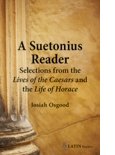 A Suetonius Reader A Suetonius Reader
Selections from the Lives of the Caesars and the Life of Horace
Josiah Osgood
xxix + 159pp. (2011) 5” x 7¾” Paperback
ISBN 978-0-86516-716-2 $19.00 $15.00
Where else can your students read that Augustus had rotten teeth and wore platform shoes to make himself look taller? 527 lines of unadapted Latin text selections from each of the Lives of the Caesars and the entire Life of Horace.
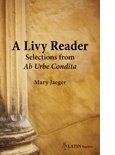 A Livy Reader A Livy Reader
Selections from Ab Urbe Condita
Mary Jaeger
xxiii + 127pp. (2011) 5” x 7¾” Paperback
ISBN 978-0-86516-680-6 $19.00 $15.00
Take your students on Livy’s lively tour of Rome’s past as he thinks deeply about historiography, its uses, and its challenges. 566 lines of unadapted Latin text.
Make sure to mention that you are an eLitterae subscriber if you place your order by phone or fax. If you place your order via www.BOLCHAZY.com the eLitterae sale price will be charged at checkout.
One copy, prepaid, no returns, not available to distributors. Offer expires 03/15/11 |
|
Ideas for President's Day
As we celebrate President's Day, February 21, the following may be timely for use in class. The lesson is adapted from Elizabeth Heimbach's Latin Everywhere, Everyday (Bolchazy-Carducci, 2004).
A motto connected to Abraham Lincoln
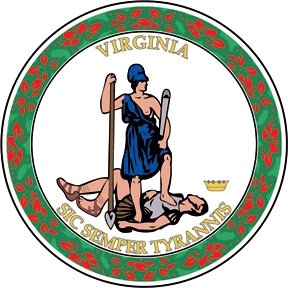
Feel free to project this image in class and walk students through its symbolism. Use the following questions to prompt students.
1. What does the word tyrannis evoke?
2. What is used to symbolize the tyrant's power?
3 What Roman figure(s) does the tyrant figure bring to mind?
4. What virtue might the female figure represent?
5. What figures from Greek mythology does her exposed breast suggest?
6. If John Wilkes Booth, as reported, shouted this motto after shooting President Lincoln, what does it indicate about Booth's perspective on Lincoln?
Feel free to draw on the following information as you and your class discuss the seal and its Latin motto.
sīc semper tyrannīs
Literal translation: thus always <it happens> to tyrants
When you hear the word tyrannis, you might think of the dinosaur Tyrannosaurus Rex, but the motto of Virginia has nothing to do with dinosaurs! Instead, an actual tyrant is shown on the state seal. He is lying on the ground, and a fierce warrior woman is standing with her foot on his neck. The woman represents Virtus, the spirit of Virginia. Virtus in Latin means “courage.” Sīc can be used in English to mean “thus,” “in this way.” When there is a grammar mistake in a quotation, the writer who is making the citation will add sīc to show that the error came from the person being quoted, not from the writer.
Latin phrases to discuss on President's Day


Write each of the three Latin phrases below on the board. More than likely, each of your students will have an image in their pocket for this activity. Ask your students to take out a dollar bill and note that the front honors our first president, George Washington. Then, have them take a look at its obverse and ask them to locate each of the phrases. Ask the questions below as an in-class activity.
ē plūribus ūnum
Literal translation: out of more one
More common meaning: one out of many
To Romans long ago this phrase was a description of stew or soup, one dish made from lots of different ingredients. To Americans today this motto is a reminder that our nation is made up of people from many different backgrounds and cultures. Another way to look at the phrase is to remember that we have one federal government made up of many states. You will see these Latin words on the Great Seal of the United States. They are also on the dollar bill, the penny, and the quarter.
annuit coeptīs
Literal translation: He (God) has nodded at our undertakings
More common meaning: He (God) has favored our undertakings
When you look at a dollar bill, you will see two other Latin phrases besides Ē Plūribus Ūnum. Both are quotations from the great Roman poet Vergil. Annuit Coeptīs comes from Book 9 of the Aeneid, Vergil’s epic poem about the founding of Rome. It is interesting that annuit literally means “nods,” but it comes to mean, “nods agreement” or “nods favor.” Coeptīs is related to the verb coepi meaning “to begin.”
novus ōrdō seclōrum
Literal translation: a new order of ages
More common meaning: new world order
Before he wrote the Aeneid, Vergil wrote a book called the Bucolics to celebrate the land of Latin Italy and a life of farming. This phrase comes from the fourth book of the Bucolics. It is sometimes translated, “A new order of ages” because seclōrum comes from the the Latin word seclum (also spelled saeclum or saeculum) which means “age” or “generation.”
Questions for Students about Latin on the US Dollar Bill:
1. Explain the similarity between the Latin phrase, ē plūribus ūnum, and the English phrase, “a melting pot.”
2. How does the phrase ē plūribus ūnum also apply to the government of the United States?
3. Explain the connection between the phrase "one nation indivisible" from the Pledge of Allegiance to the pertinent Latin phrase of the three on the dollar bill.
4. How might those who promote the phrase "For God and Country" find validation on the dollar bill?
5. Explain how someone would affirm that in celebrating the original founding of Rome, Vergil was honoring the founding of a "new Rome."
6. Convert the date, at the base of the pyramid, using Roman numerals and explain its connection to the phrase novus ordo seclōrum.
7. What was the "new order of ages" that Congress celebrated when it approved the design for the dollar bill?
You may also want to share the following quote from George Washington's 1783 farewell letter to his army.
"The foundation of our Empire was not laid in the gloomy age of Ignorance and Superstition, but at an Epoch when the rights of mankind were better understood and more clearly defined, than at any former period."
For students of Vergil:
Rembrandt Peale's portrait of George Washington hanging in the Old Senate House honors the first president with the phrase pater patriae. What does that phrase mean? Explain whether it is aptly used or not.
Check out Peale's painting at http://mcfinearts.com/Templates/Peale_Rem.htm. |
|
We will share our fun tidbits with eLitterae subscribers whenever we can. We welcome tidbits that eLitterae readers would like to share. Send them to me at Leaannbhs@aol.com.
Super Bowl's Latin Connection
When the Green Bay Packers defeated the Pittsburgh Steelers 31 to 25 to win Super Bowl XLV (note the Roman numerals!), the team returned home with its fourth Lombardi Trophy. The trophy is named for renowned Packer coach and football legend Vince Lombardi. One of the famed "Seven Blocks of Granite," Lombardi graduated from Fordham in 1939 and was hired at St. Cecilia High School in Englewood, New Jersey, to coach football and teach. For six of his eight years at St. Cecilia, Lombardi's football teams won the state title while he taught high schoolers physics, chemistry, algebra, and Latin! Lombardi went on to coach at Fordham, at West Point, and for the Giants. 1959 marked his arrival in Green Bay and the rest is history.

Green Bay's first three Lombardi Trophies on display.
I've always liked to share the following quote from Lombardi about excellence.
"The quality of a person's life is in direct proportion to their commitment to excellence, regardless of their chosen field of endeavor." |
|
Latin for the New Millennium Teaching Tip |
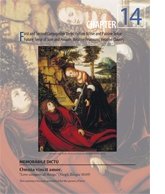 LNM 1 Chapter 14 LNM 1 Chapter 14
The chapter images of Latin for the New Millennium were chosen not only to illustrate each chapter's Latin reading but also to serve as a pre-reading activity. In chapter 14, Lucas Cranach's painting provides an engaging interpretation of Pyramus and Thisbe, one that tells a story. Teachers may consider using the following prelection activity to prepare the students for the Ovid passage.
Ask students to describe what they see in the painting. With prompts as needed, lead them to notice the sword and its position. What might that be telling the viewer? Have them look at the enlargement of Pyramus' face at the left of the center image. Prompt the students to recognize that his expression is lifeless. With those pieces in place, ask the class to describe what took place prior to this scene, what is taking place in the depicited scene, and what will be the net result. If at some point in the give-and-take the students are having difficulty putting the story together, the teacher might ask students to think of a popular Shakespearean play that involves two young lovers. As many students read Romeo and Juliet in junior high or ninth grade, they might then more readily interpret the painting. If students are able to do so without this clue, save Romeo and Juliet for discussion following their reading of the Ovid story. Then, ask them to think about a similar Shakespearean story and how the two are similar, indeed, how Shakespeare's is based on Ovid's. |
|
|
